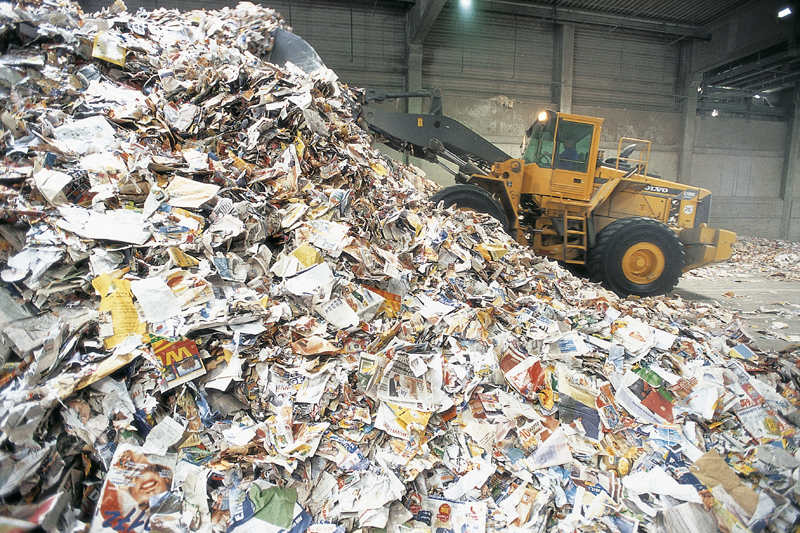Toner News Mobile › Forums › Latest Industry News › Decriminalize Paper, Please
- This topic has 0 replies, 1 voice, and was last updated 9 years, 7 months ago by
Anonymous.
-
AuthorPosts
-
AnonymousInactiveDecriminalize Paper, Please
James CopelandI’m sure you’ve heard the term “paperless” floating around classrooms and everyday media. In reality, the paperless initiative is a baseless environmental claim that is terribly misleading.
If you are taking Composition 100 this semester, you may have noticed a statement on page ii of the textbook about the publisher’s environmental impact and their “green” initiatives.
“We are faced with enormous environmental issues due to the large amount of paper contained in our print products,” Fountainhead Press, the textbook’s publisher, said. “When we do print, we donate a portion of our revenue to green causes.”
They list the ways they avoid using paper, which include using flash drives, CDs and PDFs whenever possible.
The publisher gives the impression that the act of printing anything on paper for any reason is bad.
Domtar, the largest integrated marketer and manufacturer of uncoated, freesheet paper in North America, would disagree. Now, of course, they are in business to make money selling paper.
“Through misleading environmental claims like deforestation in North America, excessive energy consumption and crowded landfill sites, (paper has) been the source of bad publicity,” Domtar said. “However, with a little more information, it soon becomes clear that paper isn’t the cause of environmental destruction. In fact, it just may offer a solution.”
Being a leader in the paper products business, it would make good business sense for Domtar has to understand forestry.
“With so many pressures upon forests, we have the responsibility to be good stewards to ensure that forests are healthy today and that we can pass them on to future generations in as good or better condition than we found them,” Domtar said. “This is the goal of modern forestry.”
The forestry industry in America is all about conservation.
“Making paper doesn’t destroy forests,” Domtar said. “In fact, the forest products industry plants more than 1.7 million trees per day.”
While environmentalists label cutting down trees as bad, forests require constant maintenance to keep from turning into greater fire hazards. If dead or diseased wood is not removed, it can quickly become a major issue. If a fire does start, it can cause millions of dollars in damage to property and lives, not to mention the environment. Ironically, proper forest maintenance of cutting down trees actually helps save the environment.
Bottom line, forestry is a sustainable industry concerned with protecting our natural resources. Trees are just products of soil, water and carbon dioxide that produce fantastic natural resources for mankind.
Despite the fact that forestry products have the potential to be 100 percent renewable, environmental causes still target paper use as evil. While they are pointing their electronic fingers, their “eDevices” are sucking more and more power out of the wall, using electricity that is by and large coming from non-renewable sources.
According to the Institute for Energy Research, a mere 9.3 percent of energy comes from renewable sources, in the U.S. A whopping 82.1 percent of our energy comes from coal, oil and natural gas. We’re not going to discuss the 8.5 percent left over for nuclear sources. That’s another controversial can of worms.
So, back to those paperless devices. Laptops, tablets and smartphones require a constant supply of electricity to operate. Plugging a cord into a wall isn’t as obviously “wasteful” as crumpling up a sheet of paper and throwing it in the trash, but the constant use of electricity adds up over time.
“Going paperless and solely using the electronic medium does not mean there are no ramifications to the environment,” Domtar said.
Some may argue that a paperless device will pay for itself by saving paper, but with the high cost of electronics and rising cost of electricity, the savings are not as great as they might initially appear.
Paperless devices also come with a hoard of potential technical issues and problems. Electronic devices have a limited lifespan, and eventually contribute to waste management problems because they cannot be completely recycled.
Paper is not bad, and should be celebrated. While it can and will never be completely replaced, even Domtar acknowledges that paper and pixels both have their place.
“The emphasis should not be on which medium has the worse environmental impact but on when to use which medium and on ways to reduce the size of the environmental footprint,” Domtar said.
Paper and digital media cannot survive without each other. Both are important means of communication.
“Both electronic and print media are important, and both impact the environment in their own ways — from the use of natural resources, to energy consumption, to batteries and hazardous waste,” Domtar said. “But with the right paper and the right choices, it is possible to communicate efficiently and responsibly.”
So next time you hear paperless is the future, stop and remember the truth. Paper isn’t going anywhere anytime soon.
-
AuthorSeptember 25, 2014 at 12:03 PM
- You must be logged in to reply to this topic.



